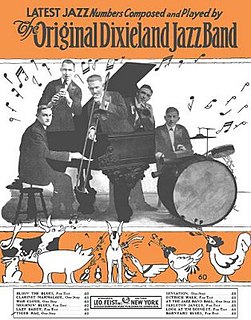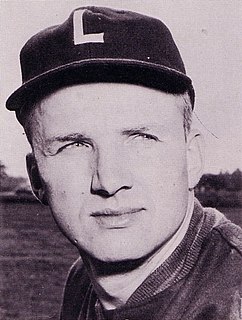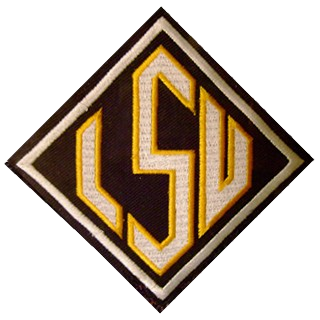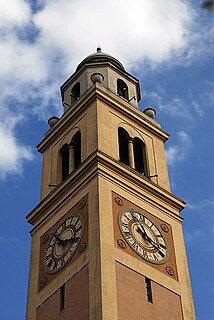Related Research Articles

Louisiana State University is a public land-grant research university in Baton Rouge, Louisiana. The university was founded in 1853 in what is now known as Pineville, Louisiana, under the name Louisiana State Seminary of Learning & Military Academy. The current LSU main campus was dedicated in 1926, consists of more than 250 buildings constructed in the style of Italian Renaissance architect Andrea Palladio, and the main campus historic district occupies a 650-acre (260 ha) plateau on the banks of the Mississippi River.
In several countries’ sports, a fight song is a song associated with a team. In both professional and amateur sports, fight songs are a popular way for fans to cheer for their team, and are also laden with history; in singing a fight song, fans feel part of a large, time-honored tradition. Although the term "fight song" is primarily used in the United States and Canada the use of fight songs is commonplace around the world, but they may also be referred to as team anthems, team songs or games songs in other countries, including Australia, Mexico and New Zealand. Fight songs differ from stadium anthems, used for similar purposes, in that they are usually written specifically for the purposes of the team, whereas stadium anthems are not. In Australian Rules Football it is tradition for the song to be sung by the winning team at the end of the game.

"Tiger Rag" is a jazz standard that was recorded and copyrighted by the Original Dixieland Jass Band in 1917. It is one of the most recorded jazz compositions. In 2003, the 1918 recording of "Tiger Rag" was entered into the U.S. Library of Congress National Recording Registry.

The LSU Tigers and Lady Tigers are the athletic teams representing Louisiana State University (LSU), a state university located in Baton Rouge, Louisiana. LSU competes in Division I of the National Collegiate Athletic Association (NCAA) as a member of the Southeastern Conference (SEC). Based on winning percentage, the university's athletics program is consistently one of the best in the nation.

The LSU Tigers football program, also known as the Fighting Tigers, represents Louisiana State University in college football. The Tigers compete in the Football Bowl Subdivision (FBS) of the National Collegiate Athletic Association (NCAA) and the Western Division of the Southeastern Conference (SEC).

The LSU Tigers baseball team represents Louisiana State University in NCAA Division I college baseball. The team participates in the West Division of the Southeastern Conference. It is one of the elite college baseball programs in the nation, ranking seventh all-time with 18 College World Series appearances and second all-time with six national championships. The Tigers play home games on LSU's campus at Alex Box Stadium, Skip Bertman Field-, and they are currently coached by Jay Johnson.
The 1893 LSU football team represented Louisiana State University during the 1893 college football season. This was the first year that LSU sponsored a football team. The Tigers were coached by university professor Dr Charles E. Coates against in-state school Tulane of New Orleans. The game sparked a rivalry between the Tigers and the Green Wave that has lasted generations. Future Louisiana governor Ruffin G. Pleasant was the quarterback and captain of the LSU team. In the first game against Tulane, LSU football players wore purple and gold ribbons on their uniforms. According to legend, purple and gold were chosen because they were Mardi Gras colors, and the green of Mardi Gras was sold out. An LSU baseball team had also worn purple and gold in its first varsity game against Tulane earlier in 1893, even though LSU's official colors at the time were actually blue and white.

Paul Franklin Dietzel was an American football player, coach, and college athletics administrator. He served as the head coach at Louisiana State University (1955–1961), the United States Military Academy (1962–1965), and the University of South Carolina (1966–1974), compiling a career record of 109–95–5. Dietzel's 1958 LSU team concluded an 11–0 season with a win over Clemson in the Sugar Bowl and was a consensus national champion. For his efforts that year, Dietzel was named the National Coach of the Year by both the American Football Coaches Association and the Football Writers Association of America. Dietzel also served as the athletic director at South Carolina (1966–1974), Indiana University Bloomington (1977–1978), LSU (1978–1982), and Samford University (1985–1987).

The LSU Tigers men's basketball team represents Louisiana State University in NCAA Division I men's college basketball. The Tigers are currently coached by head coach Will Wade. They play their home games in the Pete Maravich Assembly Center located on the LSU campus in Baton Rouge, Louisiana. The team participates in the Southeastern Conference.

The LSU Tigers softball team represents Louisiana State University in NCAA Division I college softball. The team participates in the Southeastern Conference (SEC) and plays home games in Tiger Park. The team is currently coached by Beth Torina.
The Auburn University Marching Band (AUMB) is the marching band of Auburn University and the 2004 recipient of the Sudler Intercollegiate Marching Band Trophy. With 380 members, the band traces its origins to 1897 when M. Thomas Fullan proposed to then-president Dr. William Broun that the drum corps accompanying cadet drills be replaced with a full instrumental band.

The Louisiana State University Tiger Marching Band is the marching band of Louisiana State University (LSU). The 325-member band performs at all LSU football home games, all bowl games, and all away games.

The Alabama–LSU football rivalry, also known as the "First Saturday in November", is an American college football rivalry between the Alabama Crimson Tide football team of the University of Alabama and the LSU Tigers football team of Louisiana State University. Both schools are charter members of the Southeastern Conference (SEC), and both universities' sports teams have competed in the SEC's West Division since the conference was split into two divisions in 1992.

Thomas Tyra was an American composer, arranger, bandmaster, and music educator.

The Battle for the Rag is the name given to the LSU–Tulane football rivalry. It is an American college football rivalry game played by the LSU Tigers football team of Louisiana State University and the Tulane Green Wave football team of Tulane University. The game was played nearly every year since its inception in 1893, with the last of ninety-eight games being played in 2009. Tulane and LSU spent much of their athletic histories as members of the same conference: the SIAA from 1899 to 1920, the Southern Conference from 1922 to 1932, and as charter members of the SEC from 1932 to 1966.

Southern Pride is the name for the marching band of Georgia Southern University located in Statesboro, Georgia.

The Mighty Sound of Maryland is the marching band of the University of Maryland. It was founded in 1908 at what was then known as the Maryland Agricultural College. The band performs pregame, halftime, and fifth-quarter shows at all Maryland Terrapins home football games, and travels to at least one away game each year.

Louisiana State University is the flagship university of the state of Louisiana, United States. This article describes the traditions of the university.

The LSU Indoor Practice Facility, built in 1991, is a climate-controlled 83,580 square feet facility connected to the Football Operations Center and adjacent to LSU's four outdoor 100-yard football practice fields. It holds the 100-yd Anderson-Feazel LSU indoor field. The playing surface is Momentum Field Turf by SportExe. The indoor practice facility is adjacent to both the football-only weight room and LSU's four outdoor practice fields. Besides allowing the team to practice during inclement weather, the indoor practice facility is used for LSU's summer endurance training and summer football camps.
The Chinese Bandits were the backup defensive unit on coach Paul Dietzel's LSU Tigers football teams, most notably the 1958 and 1959 teams. The name was also used briefly by the Army Cadets football team during Dietzel's coaching tenure at the U.S. Military Academy. At LSU, they made up the third unit of Dietzel's "three-platoon system." While they lacked experience and talent, the Bandits were notable for their tenacity and toughness. The unit was hugely popular among fans, and has since become part of LSU sports lore.
References
- ↑ Studwell, William E.; Schueneman, Bruce R. (1998). College Fight Songs: An Annotated Anthology. New York, NY: The Haworth Press, Inc. p. 11. ISBN 978-0789006745 . Retrieved December 8, 2014.
- ↑ "Ranking the Top 50 College Football Fight Songs". bleacherreport.com/. Retrieved 2014-12-08.